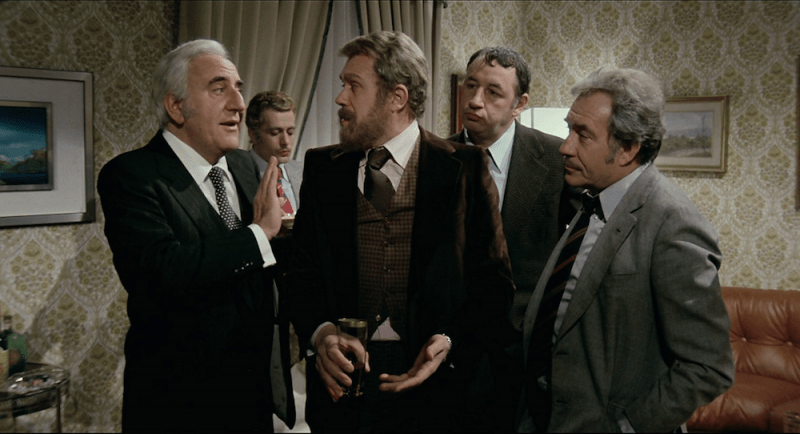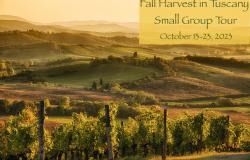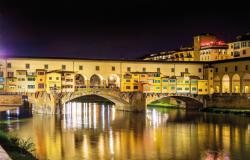If you’ve ever been to a Tuscan market, you might’ve spied a strange-looking pack of meaty morel-looking morsels called fegatelli all’aretina. Though largely composed of chunked-up pig's liver, their alien appearance stems from a most unusual sheath — caul fat, the lacy barrier surrounding the animal’s digestive organs. Used to protect these delicate guts on the grill, it ensnares in its net not only bay leaves and fennel seeds for flavor, but a whole etymological vortex.
Just as they might enrich a trip to the market or macellaio (butcher), the linguistic layers of liver that follow could deepen a first or fifteenth viewing of Mario Monicelli’s 1975 film Amici miei (My Friends). One of the most beloved comedies in the history of Italian film, Amici miei follows the exploits of an all-male, middle-aged friend group in Florence, with fraternal camaraderie and fegatelli all’aretina both figuring into the storyline.
The ingredients
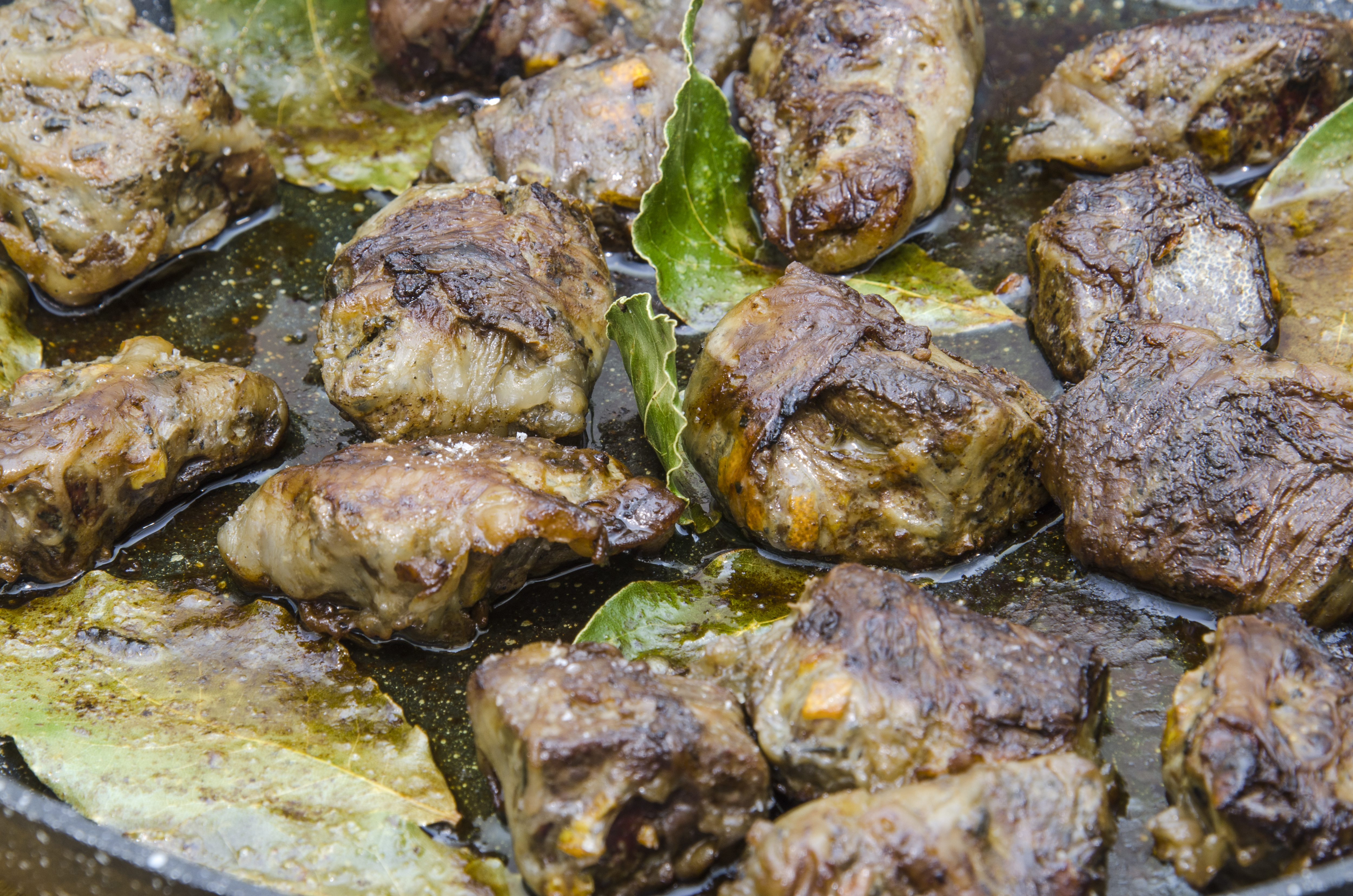
Many cultures, from the Greeks to the Assyrians, once believed the soul to be contained in the liver, rather than the heart or brain. The English word “liver” and its Germanic cognates may well find their origins in the Ancient Greek word, liparein, meaning “to persevere” — to go on living, as it were.
In Italian, fegatelli is the plural diminutive of the word for liver, fegato, itself stemming from an ancient tradition of force-feeding animals with dried figs to flavor and fatten their foie. Each practice, both fig and caul, spans epochs and time-honored culinary tomes: Liver is referred to as ficatum in the ancient Apicius and as figatelli in Maestro Martino’s 15th-century Libro de arte coquinaria. Notably, the latter cookbook's recipe for fegatelli all'aretina used fennel — a standard ingredient in Tuscan preparations of the dish today. The regional tendency to include finocchio — the Italian word for the bulbous vegetable — gets a call-out by Amici miei’s Florentine characters in one scene.
But the film’s fennel-in-fegatelli all’aretina reference is likely not just a reiteration of the characters’ Tuscan tastes. It could be a barely-detectable nod to their buffoonery: In his book A Feast of Weeds, the Milan-based scholar Luigi Ballerini writes that the word finocchio first appeared in the 13th century to describe the type of doofus who pokes themself in the eye while making the sign of the cross. Equally — though perhaps less palatably to 2022 viewers — the reference could be a slight dig at the group’s subtle homoeroticism: Since the early 19th century, finocchio has been used as a homophobic epithet, however offensively or inexplicably.
Meanwhile, the all’aretina in fegatelli all’aretina could be interpreted as “Arezzo-style.” But while residents of that Tuscan city certainly consume the dish, here, the phrase more likely refers to that “little net” of caul fat, or retina. For anglophones, there is another noteworthy linguistic overlap — this time from the north — where a similarly visceral sausage referred to as a “faggot” (ffagod in Welsh) has been a popular peasant food for centuries. As food historian Adam Balic notes, the name is often attributed to the bundling and roasting of such on sticks. This tracks with the Italian fagotto, derived from the Latin fascis, referring to a bundle of wood.
Though it’s easy to assume such offal to be mere scraps for the poor — as it has been in the case of the British — figatum’s linguistic heritage and its presence across all this literature remind us that the dish was once enjoyed by the elite. So, with an eye on crude allusion and class divide, let’s take a closer look at Amici miei, a cinematic classic and the rare truly Florentine film.
The execution
“Leopardi, sitting behind the hedge on top of the hill, thinking of infinity, began to weep bitterly. But after a while, I would start laughing. And I find my position equally respectable and worthy of consideration.” — Giorgio Perozzi (played by Philipe Noiret)
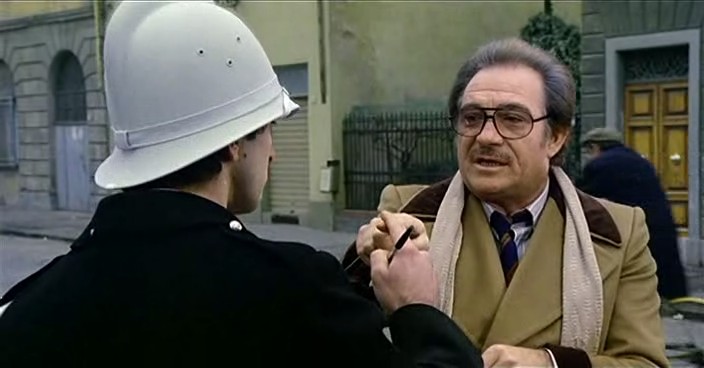
Amici miei truly kicks off outside of Bar Necchi in Florence’s San Niccolò neighborhood, just behind Piazza Demidoff on Via de’ Renai. As friends Perozzi (Philipe Noiret) and Melandri (Gastone Moschin) honk their horn, waiting for the bar’s owner (Duilio Del Prete) to emerge, a young police officer threatens to issue them a ticket for disturbing the peace.
Enter Count Rafaello “Lello” Mascetti (Ugo Tognazzi), who strides toward the car with all the pageantry befitting of his noble status. Before the poor cop knows what’s hit him, Mascetti is spouting what he calls his supercazzola — a nonsense word meaning, roughly, “mega-bullshit” (and a term that later became linked to its beloved deliverer, Tognazzi). The supercazzole — plural — are a flurry of technical-sounding but senseless name drops that have the officer fearing for his job rather than issuing a ticket.
And so begins the series of zingarate (roughly translating to “gypsy pranks”) that define the film, as the friends take us on a raucous, episodic tour through a Florence strikingly devoid of its famed landmarks. Unfulfilled by work, by love, even by sex, the men rely on one another to brighten their days and nights, sparing neither expense nor subject in their blind pursuit of hijinks.
Reportedly based on a real group of Tuscan friends dating back to the 1930s, the men seem to have little in common beyond their love of larks. Necchi (Duilio Del Prete) is a happily married, mildly sadistic bar owner; the architect Melandri (Gastone Moschin) is a bachelor and bleeding-heart romantic; Perozzi (Philipe Noiret), a journalist and our de-facto narrator, flaunts his childishness before his disapproving son and ex-wife; and the disgraced Mascetti, a nobleman with nary a lira in his pocket, struggles to balance an unhealthy affair with a family at home.
The unwillingness to get serious, or to express love in a socially acceptable manner, unites this boys’ club. The men meander about, unrepentantly engaging new subjects into their complicated network of zingarate. There’s no hope for growth or flaw resolution here, but simply a few laughs brought on by these doofuses’ perverse brand of affection.
The digestion
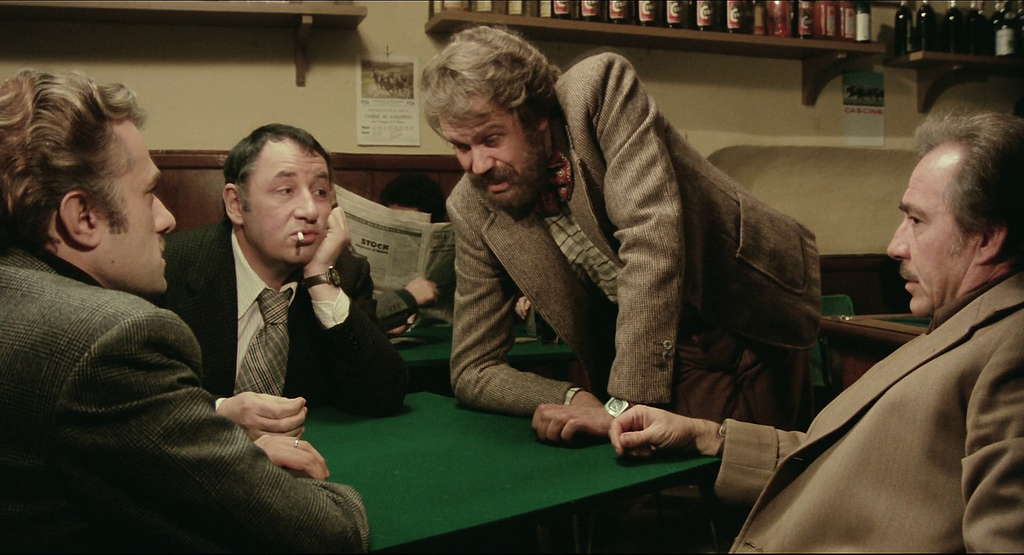
Though this theme of playful brotherhood is the source of much of the film’s fun, there’s a sadness that colors Amici miei, most notably in Carlo Rustichelli’s somber score. Lurking beneath the slapstick and sadism, too, are subtle hints of class satire, as director Monicelli was wont to include in his films. This comes through most clearly in a scene that takes place on the road to Cintoia in Greve in Chianti, just south of Florence.
Having pulled their latest zingarata on unsuspecting residents of Calcata Vecchia, the men consider having lunch in a countryside trattoria, pulling over to a bluff where they can leer at the female factory workers below. Half in jest, they effectively draw straws over who will be responsible for covering Mascetti’s tab; the Count, catching wind of their game, throws a tantrum, suggesting that as a guest, a nobleman like himself shouldn’t have to pay at all.
As Mascetti pouts in the car, the others contemplate their rustic meal, dreaming of pappardelle with duck, fegatelli all’aretina — with fennel, they insist! — and a side of ovoli, known in Roman times as the “mushroom of the kings” (to which Necchi refers by gesturing cartoonishly toward his testicles).
Alongside this move straight from the playbook of Freud — or perhaps of the obscene Tuscan poet Aretino — the Count’s constant denigration hints at his kind’s looming obsolescence. Though he’s quick to remind his friends of a time when he could’ve bought and sold them and the factory workers below, this nobleman who has squandered fortunes must directly confront his need of the proletariat’s support. Unskilled and largely unwilling to work, Mascetti rejects charity under the pretense of maintaining his dignity, forcing his friends to support him in secret.
Mascetti’s emasculation, which continues in two sequels to comedic effect, was a recurring theme throughout Ugo Tognazzi’s career. Tognazzi was happy to cultivate a reputation as a bon vivant, particularly in a series of indulgent cookbooks that included Afrodite in cucina (Aphrodite in the Kitchen) and L’abbuffone (the first English translation of which Contra Mundum Press will publish on November 19, under the title The Injester). But his filmography often ran counter to that image: Barely two years prior to Tognazzi’s turn in Amici miei, for example, he joined Noiret and two other egocentric friends (played by Marcello Mastroianni and Michel Piccoli) in Marco Ferreri’s La grande abbuffata, in confronting their greed head-on by gorging themselves to death. In Amici miei, instead, he plays a man who would sooner starve than self-reflect.
As his middle-class friends move on to enjoy their meal, then, Mascetti can only stand idly by as his lunch, and by extension his manhood, is devoured by the lower class. In its skewering, Monicelli's film offers perhaps the most famous rendering of Tognazzi’s signature brand of humor, what, in the “post-face” of The Injester, the director Alberto Bevilacqua calls “sarcastic nostalgia.”
Or, perhaps as Mascetti would say, the supercazzola is simply prematurata. Our little boys’ club, that is to say, is simply full of it.
Where to…

Eat
If you don’t have a spit handy, seek out braised fegatelli with a side of mushrooms at Florence’s Alla Vecchia Bettola, just across from Piazza Tasso at Viale Vasco Pratolini 3/5/7.
Explore
Thanks to the work of the folks at Davinotti, one could spend an entire day exploring Amici miei’s Florentine locations. The site of the fictional Bar Necchi (Via de’ Renai 17) is the most famous, though the venue has changed hands frequently and is currently closed. (Its neighbor up the road at number 29 previously housed an Italian comedy-themed novelty shop called — what else? — Supercazzola.)
If you’re near Rome with a car, drop by the little hilltown of Calcata Vecchia, where the friends pull over to plan out pranzo (lunch). Incredibly, the village — infamous for its bizarre associations with the theft of the santo prepuzio, AKA the alleged foreskin of Jesus — was condemned by the Italian government, and is now renowned as a medieval ghost town-slash-hippie squat.
Read
The Injester — Dominic Siracusa’s and Gianluca Rizzo’s original English translation of Tognazzi’s cookbook-memoir L’abbuffone, published by Contra Mundum Press — will be available in bookstores beginning November 19.
Watch
At the time of writing, Amici miei is available for streaming through Google Play.
